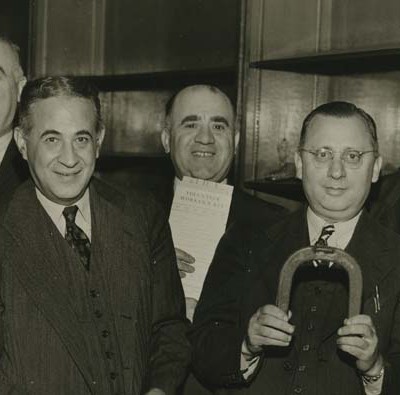
After working as a traveling hosiery salesman for his father-in-law, Robert E. Comins opened a wholesale house on Fifth Avenue specializing in rubber footwear such as galoshes, boots and sneakers. The business supplied small-town retail stores across the region, including those owned by the Pollock Family and the Ilkuvitz Family.
While always able to count on outdoorsmen, Comins’ business depended greatly on the weather. The company reportedly sold its entire inventory in a single day during the 1950 snowstorm that blanketed Appalachia. As tennis shoes became popular for every day wear in the 1960s, Comins found success as the regional distributor for Converse.
For much of its existence, the business was located at 907 Fifth Avenue. The six-story building had a freight elevator and chutes, which his children would ride in cardboard boxes. The building was tall enough to look onto the parade that often ran along Fifth Avenue. “It was like having box seats at the stadium,” his daughter Amy Lowenstein later recalled.
After the Urban Redevelopment Authority demolished 907 Fifth Avenue in the mid-1950s to make room for Chatham Center, Robert E. Comins relocated his business to the Boulevard of the Allies. “The URA took good businesses and cleared us right off the street,” Comins told the Pittsburgh Post-Gazette in 1977. “There were a lot of crazy people with wild ideas who didn’t have the money to back them up. They wanted to make the Lower Hill District a classy area and they didn’t think wholesalers fit in.” As a niche seller, Comins’ business stayed strong for decades, but declined in the era of mass merchandising and the decline of small towns. Comins liquidated his inventory in 1988.
For much of his career, Comins was active in the Pittsburgh Wholesale Credit Association. The organization monitored the economic viability of retailers and also played an important social function among the Jewish wholesalers in Uptown, particularly through its World War II era war drives and its annual banquet. As a member of the United Jewish Fund Mercantile Division, Comins raised funds for annual capital campaigns.
As the president of Jewish Family & Children’s Service in the early 1950s, Comins oversaw the opening of a counseling center for families. “It is difficult to admit the need for help to anyone ‘outside.’ Yet we at Jewish Family and Children’s Service hold that asking for professional help with personal problems is as intelligent as consulting the family physician at the first sign of illness,” he told the American Jewish Outlook in 1952. “Too often, parents turn desperately for aid only when the damage is done, when children as well as adults have suffered from the ills of an upset, unhappy home.”
A man with distinct fashion sensibilities, Robert Comins parted his hair down the middle and usually wore a bowtie. In 1921, he married Belle Goldberg. They had two daughters, Amy and Louise. Amy Comins married Frank Lowenstein, who worked as a traveling salesman for the Robert E. Comins Company after graduating from the University of Pennsylvania and serving for three years in the army during World War II.